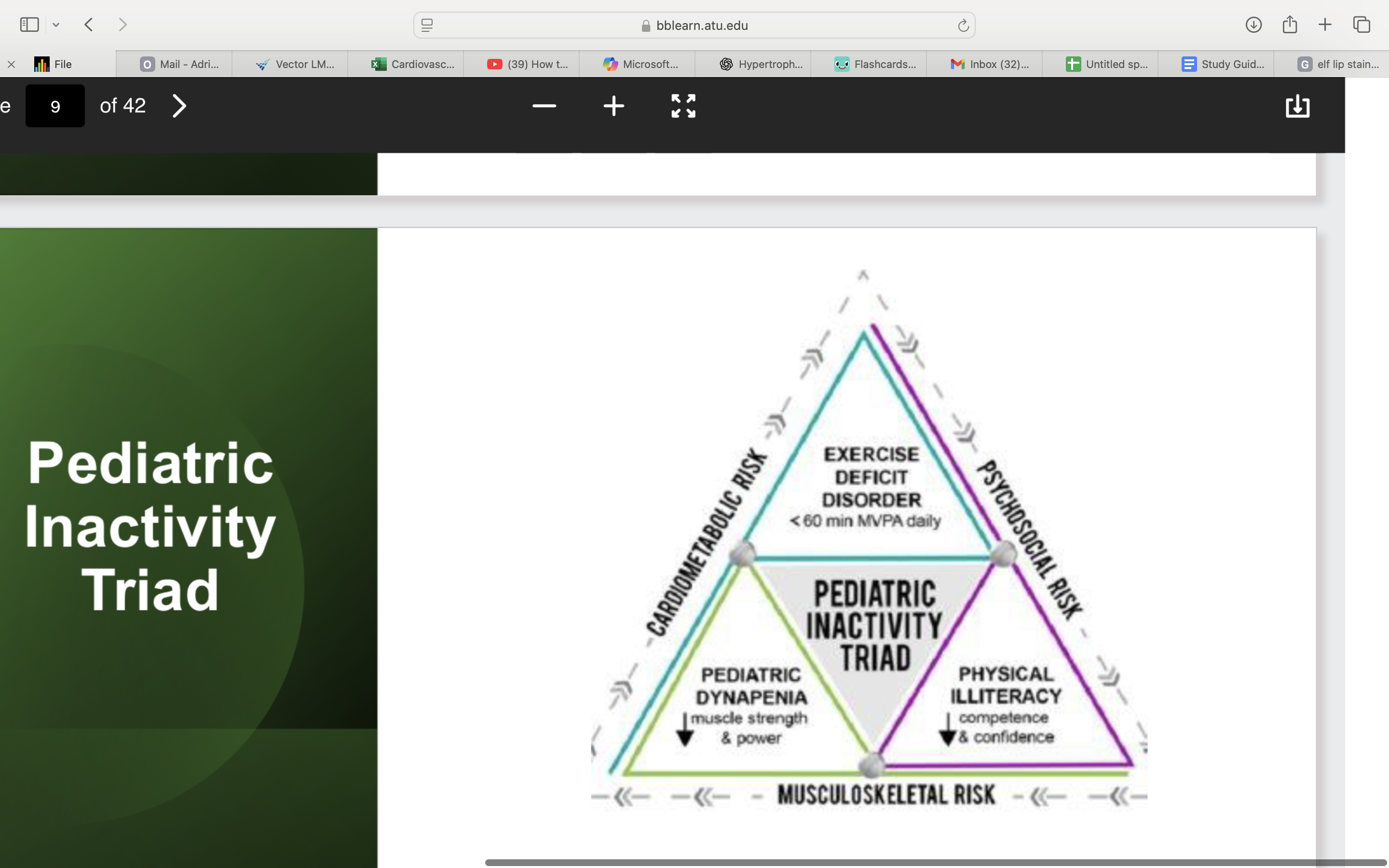Applied fitness & Development
1/20
There's no tags or description
Looks like no tags are added yet.
Name | Mastery | Learn | Test | Matching | Spaced |
|---|
No study sessions yet.
21 Terms
What are the 2030 Goals for physical activity?
Increase activity to 59% of adults
150 min per week of moderate intense exercise
75 min per week of vigorous exercise
What are communicable diseases?
Diseases that can be transmitted by bacteria, viruses, parasites, etc
Top 5 prevalent communicaple diseases in
US: Influenza, COVID-19, Hepatitis B & C, Tuberculosis, HIV/AIDS
World: Tuberculosis, HIV/AIDS, Malaria, COVID-19, Hepatitis B
What are non communicable diseases?
Chronic conditions that result from a combo of genetic, physiological, environmental and behavioral factors
Top 5 non communicable diseases in
United States: cardiovascular diseases, cancer, diabetes, chronic respiratory diseases, and mental health conditions.
World: cardiovascular diseases, cancers, chronic respiratory diseases, diabetes, and mental health conditions.
Define Sedentarism
Lifestyle characterized by low energy expenditure while awake and is <1.5 MET of energy expenditure
How bad is physcial inactivity for human beings?
Contributes to burdens of diseases, fourth leading factor for mortality worldwide, possibly most important public health issue of this century
Why is there so much physcial inactivity?
Urbanization and motorized transport, lack of safe and accessible spaces, sedentary jobs, increased screen time, lack of time
What is METs
unit that estimates energy expenditure of physical activity
What is 1 MET equal to
the consumption of 3.5mL of oxygen per kilogram of body weight per min
What is the pediatric inactivity triad?

Three ways we can monitor exercise intensity
RPE scale, METs, or heart rate variability
What is Rate of Perceived Exertion scale (RPE)?
Tool used to measure how hard a personal feels like their body is working
What are the recommended doses for physical activity
Healthy Adults: 150 min/week moderate or 75 min/week vigorous and strength training twice/week
Older Adults: Same (add flexibility)
What is the concept of Does-Response Relationship?
More physical activity = greater health benefits
Small increases in activity also improve health outcomes
What is the PAR-Q
Physical Activity Readiness Questionnaire: determine client’s readiness for physical activity
What is the ePARmed-X+
Clearance to participate or suggestions while awaiting medical clearance
What is the purpose of the ePARmed and the PAR-Q
Examine clients record of personal illness, surgeries & hospitalization Assess previous medical diagnosis and signs & symptoms of disease that have occurred within the past year or are currently present
Determine need for medical clearance
Identify contraindications to exercise testing
What are the norms of blood pressure
Normal: <120/80 mmHg
Elevated: 120-129/80-89 mmHg
Hypertension: >130/89
What are the two values of BP
Systolic: highest pressure when myocardial contraction forces a large volume of blood into the arteries.
Diastolic: lowest pressure during the cardiac cycle when the heart is at rest
Where do we assess heart rate?
Brachial artery: anteromedial aspect of the arm below the belly of the biceps brachii, approximately 2 to 3 cm above the antecubital fossa
Carotid artery: in the neck just lateral to the larynx
Radial artery: on the anterolateral aspect of the wrist directly in line with the base of the thumb
Temporal artery: along the hairline of the head at the temple